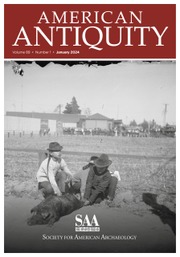Crossref Citations
This article has been cited by the following publications. This list is generated based on data provided by Crossref.
Bowen, Thomas
1973.
Seri Basketry: A Comparative View.
KIVA,
Vol. 38,
Issue. 3-4,
p.
141.
SCHAAFSMA, POLLY
1985.
Advances in Archaeological Method and Theory.
p.
237.
Davis, Owen K.
1990.
Caves as sources of biotic remains in arid western North America.
Palaeogeography, Palaeoclimatology, Palaeoecology,
Vol. 76,
Issue. 3-4,
p.
331.
Luz Gutiérrez, María De La
Hambleton, Enrique
Hyland, Justin
and
Stanley Price, Nicholas
1996.
The management of World Heritage sites in remote areas: The Sierra de San Francisco, Baja California, Mexico.
Conservation and Management of Archaeological Sites,
Vol. 1,
Issue. 4,
p.
209.
Shackley, M. Steven
Hyland, Justin R.
and
Gutierrez M., Maria de la Luz
1996.
Mass Production and Procurement at Valle del Azufre: A Unique Archaeological Obsidian Source in Baja California Sur.
American Antiquity,
Vol. 61,
Issue. 4,
p.
718.
Wehncke, Elisabet V.
López-Medellín, Xavier
and
Ezcurra, Exequiel
2010.
Blue fan palm distribution and seed removal patterns in three desert oases of northern Baja California, Mexico.
Plant Ecology,
Vol. 208,
Issue. 1,
p.
1.
Conway, Frederick J.
2014.
Local and public heritage at a World Heritage site.
Annals of Tourism Research,
Vol. 44,
Issue. ,
p.
143.
Mondragón, M.A.
Hernández-Padrón, G.
Solís, C.
del Real, A.
Trespalacios-Quijano, R.
Jiménez-Mu, C.
and
Viramontes-Anzures, C.
2019.
Multianalytical characterization of pigments from rock paintings in Guanajuato, Central México.
Journal of Archaeological Science: Reports,
Vol. 26,
Issue. ,
p.
101912.
Díaz-Andreu, Margarita
Gutiérrez Martínez, María de la Luz
Mattioli, Tommaso
Picas, Mathieu
Villalobos, César
and
Zubieta, Leslie F.
2021.
The soundscapes of Baja California Sur: Preliminary results from the Cañón de Santa Teresa rock art landscape.
Quaternary International,
Vol. 572,
Issue. ,
p.
166.
Simek, Jan F.
Alvarez, Stephen
and
Cressler, Alan
2022.
Discovering ancient cave art using 3D photogrammetry: pre-contact Native American mud glyphs from 19thUnnamed Cave, Alabama.
Antiquity,
Vol. 96,
Issue. 387,
p.
662.
Maina, John N.
2023.
Current Perspectives on the Functional Design of the Avian Respiratory System.
Vol. 8,
Issue. ,
p.
1.
González Vázquez, Natalia
García Atiénzar, Gabriel
Santos da Rosa, Neemias
Gutiérrez Martínez, María de la Luz
Villalobos, César
and
Díaz-Andreu, Margarita
2025.
GIS, sight and sound. Exploring the rock art landscapes of the Santa Teresa Canyon (Baja California Sur, Mexico) as a case study.
Digital Applications in Archaeology and Cultural Heritage,
Vol. 36,
Issue. ,
p.
e00402.


